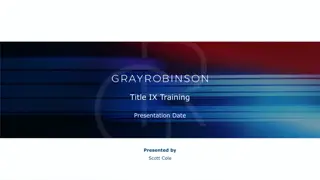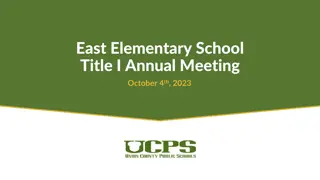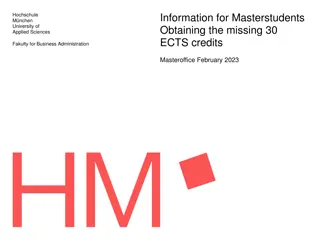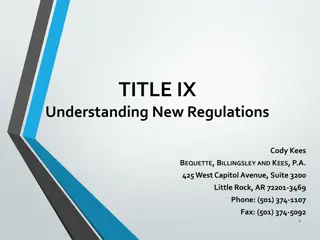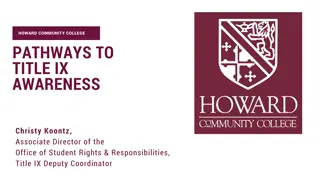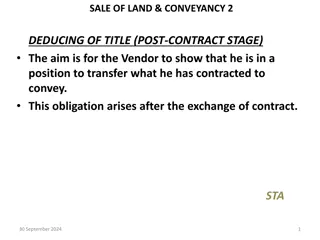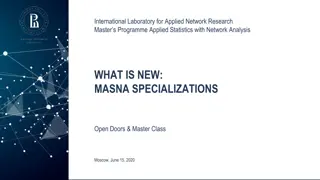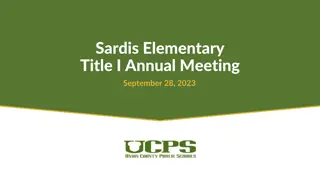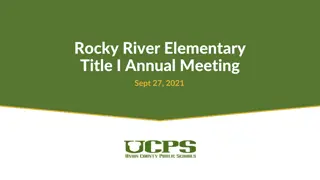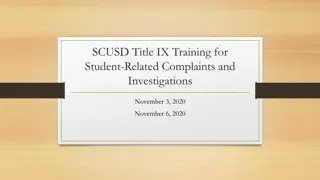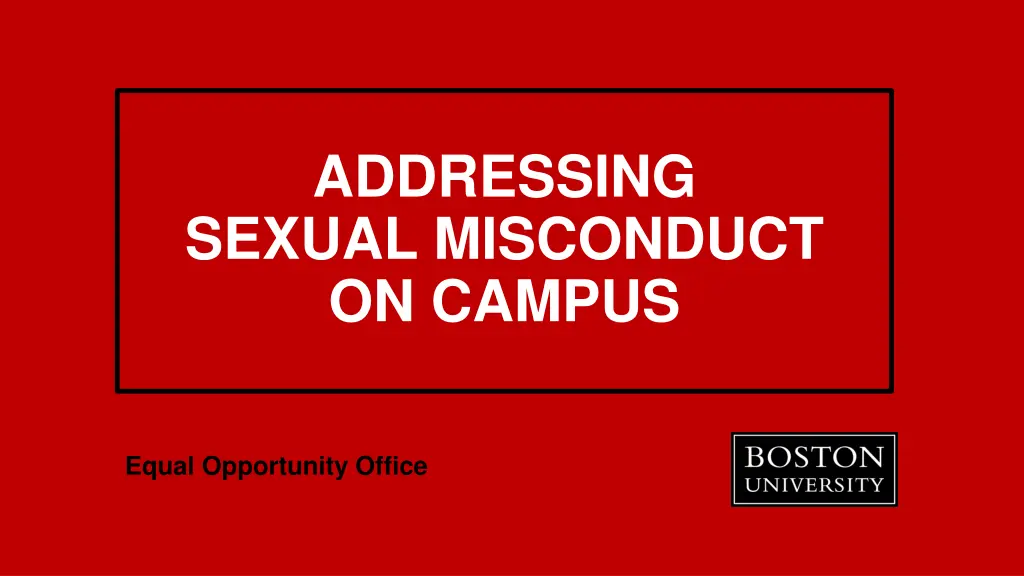
Addressing Sexual Misconduct on Campus - Boston University Resources
Learn how Boston University addresses sexual misconduct on campus through its Equal Opportunity Office and non-discrimination policies. Understand the compliance with anti-discrimination laws, focus of Title IX regulations, university policies, and equal opportunity and affirmative action policy.
Download Presentation

Please find below an Image/Link to download the presentation.
The content on the website is provided AS IS for your information and personal use only. It may not be sold, licensed, or shared on other websites without obtaining consent from the author. If you encounter any issues during the download, it is possible that the publisher has removed the file from their server.
You are allowed to download the files provided on this website for personal or commercial use, subject to the condition that they are used lawfully. All files are the property of their respective owners.
The content on the website is provided AS IS for your information and personal use only. It may not be sold, licensed, or shared on other websites without obtaining consent from the author.
E N D
Presentation Transcript
ADDRESSING SEXUAL MISCONDUCT ON CAMPUS Equal Opportunity Office
Notice of Non-Discrimination Boston University prohibits discrimination based on race, color, religion, sex, age, national origin, physical or mental disability, sexual orientation, gender identity or expression, genetic information, military service, or because of parental, veteran status or any other protected class
Compliance with Anti-Discrimination Laws BU complies with all state and federal discrimination laws, including: Title IX of the Education Amendments of 1972, a federal law that prohibits discrimination on the basis of sex in education programs and activities; and new DOE regulations effective August 14, 2020. Title VII of the Civil Rights Act of 1964, a federal law that prohibits unlawful discrimination in employment Mass. Gen. Laws chapters 151B and 151C, the state laws that prohibit unlawful discrimination in employment and education
Focus of Title IX Regulations The new regulations address sexual misconduct: Against a person in the U.S. occurring within the context of a University program/activity That is so egregious that serious consequences will likely result from a finding of responsibility: suspension or expulsion from school, termination of employment. Enhanced due process is provided to Respondents where such consequences are possible. Live hearings with cross-examination, and comprehensive evidence-sharing are the primary methods of ensuring due process. Investigations and hearings must be transparent and free from bias, sex stereotyping, and prejudgment. Universities may address sexual misconduct that does not fall within Title IX s jurisdiction under other policies.
Understanding BUs Policies and Procedures
EQUAL OPPORTUNITY & AFFIRMATIVE ACTION POLICY Prohibits unlawful discrimination, including harassment, based on: Race/Color Religion National Origin Age (over 40) Marital / Parental / Veteran status / Military Service Pregnancy and related conditions (e.g., lactation) Disability (physical/mental) Genetic Information Sex / Sexual Orientation Gender Identity or Expression Prohibits retaliation www.bu.edu/academics/policies/equal-opportunity-policy
CONSENSUAL RELATIONSHIPS WITH STUDENTS Applies to faculty, staff and other affiliates who supervise students, including student employees Prohibits affiliates from supervising students and student employees with whom the affiliate currently has, has had in the past, or reasonably expects to have in the future, a romantic/sexual relationship. All affiliates who are not students should avoid entering into romantic/sexual relationships with undergraduates http://www.bu.edu/policies/ethics-governance/
Sexual Misconduct Policy BU s Sexual Misconduct Policy ( Policy ) affirms its commitment to fostering an environment that is free from all forms of sexual harassment, sexual assault (including rape), dating and domestic violence, sexual exploitation, and stalking The Policy addresses sexual misconduct and sexual harassment as defined by Title IX, and other sexual misconduct prohibited by federal and state laws that does not fall under Title IX Separate definitions and procedures are provided to address Title IX Sexual Misconduct and Non-Title IX Sexual Misconduct.
Title IX and Non-Title IX: Two Policies in One BU s Sexual Misconduct Policy addresses both Title IX Sexual Misconduct and Non-Title IX Sexual Misconduct. The Policy applies to all students, faculty, staff, affiliates, and non- affiliates. For each type, the Policy contains definitions of the prohibited forms of conduct that are taken from the pertinent regulations. The preponderance of evidence standard applies in both Title IX and Non-Title IX cases. The part of the Policy covering Non-Title IX Sexual Misconduct is substantially similar to the BU s Sexual Misconduct/Title IX Policy that was in effect until August 14, 2020.
Title IX Sexual Misconduct Title IX Sexual Misconduct covers complaints against a person in the United States, occurring within the context of a University education program or activity An education program or activity includes locations and circumstances over which BU exercises substantial control over both the Respondent and the context in which the sexual harassment occurred The Complainant must be participating in, or attempting to participate in, BU s program or activity at the time of filing a formal complaint. Title IX is considered to be an access statute.
Title IX Sexual Misconduct Definitions Quid pro quo: A University employee conditions the provision of an aid, benefit or service on a person s participation in unwelcome sexual conduct Sexual harassment: Unwelcome conduct that a reasonable person would determine to be so severe, pervasive and objectively offensive that it effectively denies a person equal access to the University s programs or activities Sexual assault, dating violence, domestic violence and stalking
Title IX: one part of the universe Sexual Misconduct (U.S): Sexual harassment: Severe, pervasive, objectively offensive; denies access Quid Pro Quo Sexual Assault/ Dating-Domestic Violence/Stalking All forms of Sexual Misconduct (Includes Hostile Environment) and Retaliation Graphic with Permission from Grand River Solutions
Non-Title IX Sexual Misconduct Definitions Non-Title IX Sexual Misconduct is a broad, non-legal term that encompasses a wide range of prohibited behaviors, including sexual harassment, sexual assault, rape, acquaintance rape, relationship violence, sexual exploitation, and stalking Includes a hostile environment when the sexual or sex- based harassment is sufficiently serious to deny or limit a student s ability to participate in or benefit from BU s programs or activities, or has the effect of unreasonably interfering with an employee s work performance/terms & conditions of employment.
Non-Title IX Sexual Misconduct Pertains to conduct that occurs both on-campus and off-campus if the conduct: Was in connection with a University-recognized education program or activity, or work environment Has the effect of creating a hostile learning, working or living environment Denies or limits a person s ability to participate in BU s programs/activities, or interferes with terms/conditions of employment No geographic limitation (covers Study Abroad and other BU activities outside the U.S.)
Retaliation Consistent with Title IX and federal and state law, BU prohibits retaliation against a person for making a report or complaint of Title IX or Non-Title IX Sexual Misconduct, or for participating in or declining to participate in an investigation or grievance procedure related to such a report or complaint. Per se retaliation: retaliation, threats, coercion, discrimination that arise out of a report or complaint of sex discrimination or sexual harassment for the purpose of interfering with any right or privilege under Title IX Per se retaliation exception: Charging an individual with a code of conduct violation for making a materially false statement in bad faith in the course of a Title IX grievance proceeding
How to Report Sexual Misconduct All members of the BU community are encouraged to report any incident of Title IX or Non-Title IX Sexual Misconduct so that the University can respond promptly and effectively Students may report incidents to the Title IX Coordinator, a Deputy Title IX Coordinator, the Dean of Students, the Office of Judicial Affairs, or BUPD Faculty and staff may report incidents to the Title IX Coordinator, a Deputy Title IX Coordinator, the Equal Opportunity Office, a supervisor, a Dean, or a department head. All such reports will be disclosed to the Title IX Coordinator
Anonymous Reports A Complainant who files a formal Title IX complaint cannot remain anonymous or prevent their identity from being disclosed to the Respondent. Under certain limited circumstances, a Complainant who files a Non-Title IX complaint may remain anonymous. When a report is made anonymously or by a third party, the Policy will apply in the same manner as if the Complainant had made the initial report. The Title IX Coordinator or designee will make every effort to meet with the Complainant to discuss available options, including supportive measures. Confidential campus resources are available to individuals who seek counseling/support before and during the complaint process.
Mandatory Reporting Employees with responsibility for others (i.e., responsible employees) must report information regarding sexual misconduct to the University Title IX Coordinator. At BU, a responsible employee includes supervisors and officials with significant responsibility for student and campus activities including: Faculty and staff (including coaches) Student employees with supervisory authority (e.g., RAs, TAs, TFs)
Confidential Campus Resources BU provides confidential advocacy, crisis, and pastoral counseling, and medical services for individuals who have experienced sexual misconduct, whether or not they make a formal report with the University, or with local law enforcement. Confidential resources include the Student Health Services and the Sexual Assault Response & Prevention Center (SARP) for students, and the Faculty & Staff Assistance Office (FSAO) for employees. The Policy lists other confidential resources. Conferring with a confidential resource will not trigger an investigation by the University or law enforcement.
Supportive Measures BU provides a range of supportive measures to Complainants and Respondents both before and after the filing of a Formal Complaint, or when no Formal Complaint is filed Upon receipt of a report of Title IX or Non-Title IX Sexual Misconduct, the University will provide reasonable measures to restore or preserve equal access, to provide a safe environment, and to prevent additional acts of misconduct, even when there is no specific request for supportive action The University will keep confidential any accommodations or supportive measures unless maintaining confidentiality would impair the University s ability to provide such measures.
Filing a Formal Complaint under Title IX After receiving a report of sexual misconduct, the Title IX Coordinator or designee will inform the Complainant of their options, including their right to file a Formal Complaint under Title IX. Submitting a Formal Complaint with the Title IX Coordinator or designee will initiate the investigation process A Formal Complaint must include the Complainant s signature or other indication that the person filing the charge is the Complainant. A Formal Complaint must contain sufficient information to permit a Respondent to understand and respond adequately to the charges. In extraordinary circumstances, the Title IX Coordinator may sign a Formal Complaint.
Grievance Procedures The following procedures correspond to the Sexual Misconduct Policy for conduct that occurs on or after August 14, 2020: Procedures for Resolution of Non-Title IX Complaints against Students Procedures for Resolution of Non-Title IX Complaints against Faculty, Staff, Affiliates, and Non-Affiliates Procedures for Resolution of Title IX Complaints against Students, Faculty, Staff, Affiliates, and Non-Affiliates
Rights of Complainants and Respondents The grievance procedures associated with BU s Title IX and Non-Title IX policies describe a variety of rights regarding the investigation and resolution of complaints. Consult the specific policies and procedures for rights pertaining to: Respect, Privacy, Access to Information, Policies, Notices, Participation, Standard of Proof, Sanctions Presumption that Respondent is not responsible until a determination at conclusion of complaint resolution process Prompt, thorough and objective complaint resolution process Burden of proof/evidence rests on University, not parties Presence of an Advisor during investigation
Rights, continued Ability to inspect, review, and respond to evidence prior to issuance of Investigative Report Objective evaluation of all relevant evidence Live hearing involving presentation of witnesses and evidence Questioning by Advisors of parties and witnesses at hearing Self-incriminating statements Appeals of decision made or any sanctions Notification in writing of case resolution including outcome of any appeals and the final determination
Informal Resolution Process At any time during the investigation of a Formal Complaint, the Complainant and Respondent may request to participate in the Informal Resolution Process. This process may include conflict mediation or a restorative conference with a University community member. Both parties must agree to participate in this process. Either the Complainant or Respondent may choose to end the Informal Resolution Process and commence or resume the Formal Process Informal resolution is not available for cases involving allegations of Title IX Sexual Misconduct by a student against a University employee.

